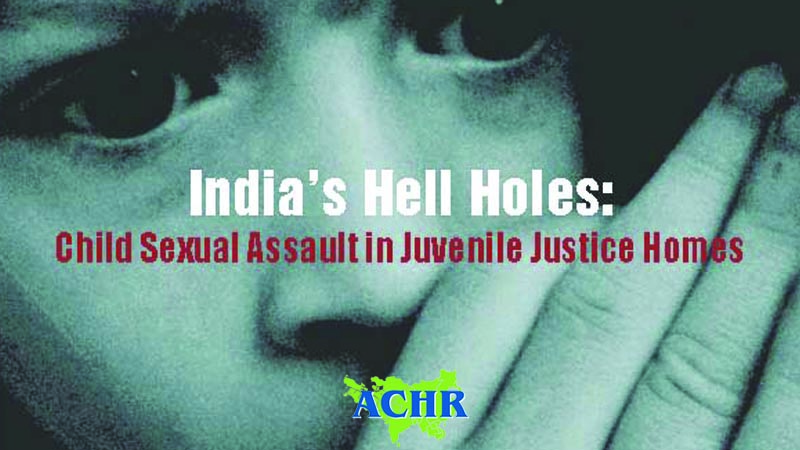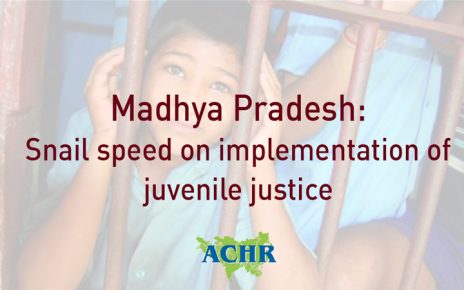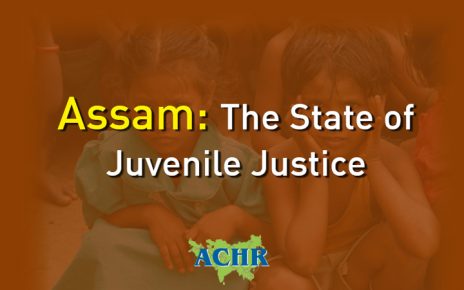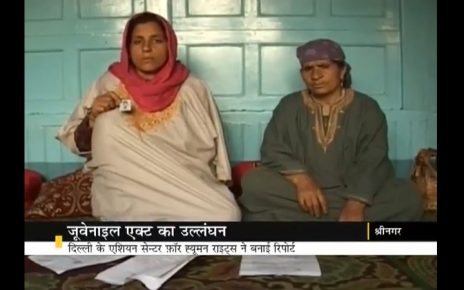Sexual offences against children in India have reached an epidemic proportion and the Protection of Children from Sexual Offences Act, 2012 (POCSO) is unlikely to be able to address the menace unless the Government of India and the State Governments take effective measures for proper implementation of the same.
A total of 48,338 child rape cases was recorded from 2001 to 2011. These include 7,112 cases in 2011; 5,484 cases in 2010; 5,368 cases in 2009; 5,446 cases in 2008; 5,045 cases in 2007; 4,721 cases during 2006; 4,026 cases during 2005; 3,542 during 2004; 2949 cases during 2003, 2,532 cases during 2002 and 2,113 cases during 2001. The registration of cases of child rape have been consistently increasing and India saw an increase of 336% of child rape cases from 2001 (2,113 cases) to 2011 (7,112 cases). These are only the tip of the iceberg as the large majority of the cases of child rape are not reported to the police while children regularly become victims of other forms of sexual assault too.
Many of the child rape cases take place in juvenile justice homes i.e. observation home, special home, or children’s home or shelter home set up, certified or recognized and registered respectively under sections 8, 9, 34, sub-section (3) of section 34 and section 37 of the Juvenile Justice (Care and Protection of Children) Act [JJ(C&P) C Act]. At the end of financial year 2011-2012, about 733 juvenile justice homes in India had received grants under the Integrated Child Protection Scheme (ICPS) of the Ministry of Women and Child Development.
It will not be an understatement to state that juvenile justice homes, established to provide care and protection as well as re-integration, rehabilitation and restoration of the juveniles in conflict with law and children in need of care and protection, have become India’s hell holes where inmates are subjected to sexual assault and exploitation, torture and ill treatment apart from being forced to live in inhuman conditions. The girls remain the most vulnerable. It matters little whether the juvenile justice homes are situated in the capital Delhi or in the mofussil towns.
This report highlights 39 emblematic cases of systematic and often repeated sexual assault on children in juvenile justice homes. Out of the 39 cases, 11 cases were reported from government-run juvenile justice homes such as observation homes, children homes, shelter homes and orphanages, while in one case a CWC member was accused of sexual harassment during counseling sessions. The remaining 27 cases were reported from privately/NGO run juvenile justice homes such as shelter homes, orphanages, children homes, destitute homes, etc. Majority of privately/NGO run homes are not registered under Section 34(3) of the Juvenile Justice (Care and Protection of Children) Act (as amended in 2006) which provides that “Without prejudice to anything contained in any other law for the time being in force, all institutions, whether State Government run or those run by voluntary organisations for children in need of care and protection shall, within a period of six months from the date of commencement of the Juvenile Justice (Care and Protection of Children) Amendment Act, 2006, be registered under this Act in such manner as may be prescribed.”
In the case of government-run juvenile justice homes, the perpetrators were staffs including the caretakers, security guards, cooks and other Class IV employees, and the senior inmates. In two cases, the sexual abuses were committed by the senior inmates in collusion with the staff.
With respect to the privately/NGO-run juvenile justice homes, the perpetrators include managers/directors/owners/founders and their relatives and friends, staff members such as caretakers, wardens, cooks, drivers, security guards, gatekeepers, senior inmates and outsiders including security forces. Out of the 27 cases in privately/NGO-run homes, inmates were responsible for the offences in five cases and out of these, in one case offence was committed in collusion with the staff.
In most cases, sexual assault in the juvenile justice homes continues for a long period as the victims are not able to protest and suffer silently in the absence of any inspection by the authorities under the JJ(C&PC) Act. While authorities are the main predators, the absence of separate facilities, in many cases for boys and girls, and in most cases as per age i.e. for boys and girls up to 12 years, 13-15 years and 16 years and above as provided under Rule 40 of the Juvenile Justice Care and Protection of Children Rules 2007 facilitates sexual assault on the minor inmates by the senior inmates.
The sexual assault on children the juvenile justice homes continues unabated as the Government of India i.e. the Ministry of Women and Child Development and the State Governments have failed to implement the JJ(C&PC)Act in letter and spirit. It failed to address four critical areas indispensable for addressing child sexual abuse in juvenile justice institutions i.e. functional Inspection Committees, registration of all juvenile justice homes, effective and functional Child Welfare Committees and separation of inmates on the basis of the nature of the offences, sex and age.
1. Inspection Committees
Most State governments have not formed Inspection Committees which are mandated to inspect the juvenile justice homes under the JJ(C&P) Act as provided under Section 65 of the JJ(C&PC) Act. Rule 63 of the Juvenile Justice (Care and Protection of Children) Rules, 2007 mandates the Inspection Committees to “visit and oversee the conditions in the institutions and appropriateness of the processes for safety, well being and permanence, review the standards of care and protection being followed by the institutions, look out for any incidence of violation of child rights, look into the functioning of the Management Committee and Children’s Committee’ at least once in every three months.
The Ministry of Women and Child Development itself has repeatedly failed to raise the need for establishment of the Inspection Committees while approving projects for all the States and Union Territories under the Integrated Child Protection Scheme (ICPS). The Project Approval Board (PAB) of the ICPS indeed never raised the issue of inspection Committees with a number of state governments despite holding discussions for approval of grants since 2010. The PAB never raised the issue of Inspection Committees with the Governments of Delhi, Chhattisgarh, Puducherry, Bihar, Jharkhand, Tripura, Uttar Pradesh, Meghalaya and Nagaland despite having yearly meetings for approval of grants since 2010. The PAB failed to give the same importance to the Inspection Committees as given to the Child Welfare Committees and the Juvenile Justice Boards (JJBs), thereby failing to address child sexual abuse in juvenile justice homes. In fact, no separate budgetary allocation has been made under ICPS for the functioning of the Inspection Committees. There is a conscious effort on the part of the Ministry to avoid the issue of the Inspection Committees.
2. Unregistered child care institutions
There are hundreds of unregistered child care homes across the country, which are not registered under Section 34(3) of the JJ (C&PC) Act, 2000. Inspection is seldom carried out in these unregistered homes and children remain extremely vulnerable to sexual abuse in these homes. These cases of sexual assault at two children homes at Mansarovar and Jagatpura in Jaipur, Rajasthan from where 51 children, mostly girls, were rescued on 12 March 2013; the Arya Anathalaya, an orphanage in Daryaganj, Delhi, the NGO-run orphanage, Supurna ka Aangan in Gurgaon, Haryana, and Sarbabhoutika Anatha Sishu Ashram Orphanage in Rourkela, Odisha cited in this report were not registered under the JJ(C&PC) Act.
Non-registration of the juvenile homes remains a massive problem. The Ministry of Women and Child Development had raised the issue of non-registration of children’s home with Jharkhand on 21 January 2013, Odisha on 9 November 2012, Arunachal Pradesh on 29 August 2012, Haryana on 29 August 2012, Rajasthan on 29 August 2012, Andhra Pradesh on 11 July 2012, Assam on 11 July 2012, Mizoram on 15 March 2012, Karnataka on 28 June 2012 and Kerala 17 January 2012, among others.
There is no punitive provision per se for non-registration of the institutions. However, Section 23 of the JJ(C&PC) Act clearly provides that “Whoever, having the actual charge of, or control over, a juvenile or the child, assaults, abandons, exposes or wilfully neglects the juvenile or causes or procures him to be assaulted, abandoned, exposed or neglected in a manner likely to cause such juvenile or the child unnecessary mental or physical suffering shall be punishable with imprisonment for a team which may extend to six months, or fine, or with both”. It is clear that appropriate action can be taken by the authorities under Section 23 following inspection.
iii. Non-functional Child Welfare Committees
Though there are 462 District Child Welfare Committees in 23 States mandated to verify fit institutions, majority of them exist only on paper. In a few cases, the State Governments have been restricting surprise inspections by the CWCs. The State Government of Karnataka while appointing the CWC members in October 2010 put the conditions that “members cannot visit child care institutions, when they are not holding a sitting, without prior permission of the heads of these institutions”. This effectively prohibits random and surprise inspections which is essential for the CWC to certify whether the institutions are “fit” as per the JJ(C&PC) Act.
Even in cases where there are no such restrictions, the functioning of the existing CWCs has been found wanting. On 16 April 2012, the Allahabad High Court while hearing the matter of sexual abuse at Rajikiya Shishu Grih, Allahabad observed as under:
“The Court must also express its disappointment that the Child Welfare Committees consisting mainly of Social Workers which have been constituted under the Juvenile Justice Act (2000) [JJ Act] for attending to the welfare of children, have shown little proactive sensitivity for addressing the myriad problems relating to children, but have simply been passing orders in a mechanical and bureaucratic manner, with no sense of mission and thus have given little relief to children in distress.”
3. Lack of segregation on the basis of nature of offences, sex and age
Recognising vulnerability of younger inmates, the Juvenile Justice (Care and Protection of Children) Rules 2007 underscored the need of classification and separation of the children on the basis of the nature of the offences, age and sex. Rule 40 provides for separate facilities between for boys and girls as well as according to age i.e. for boys and girls up to 12 years, 13-15 years and 16 years and above.
This provision has not been complied with and the recommendation of the PAB on the rationalization of the homes failed to address this particular issue. The lack of segregation on the basis of the nature of offences, age and sex facilitates senior inmates to commit the offences against minor inmates including girls.
Conclusion and recommendations
Child sexual abuse in juvenile justice institutions is rampant, systematic and has reached an epidemic proportion. Hundreds of children especially girls go missing from the juvenile justice homes either to escape from the abuses and/or being victims of trafficking. In Karnataka, as many as 1,089 children below 14 years have gone missing from 34 Bala Mandirs (Children’s Homes) during February 2005 to February 2011. In July 2012, the Calcutta High Court ordered a probe by the Central Bureau of Investigation into the alleged disappearance of 40 girls from a West Bengal government-run home and another run by an NGO. The directive was passed after the Criminal Investigative Department of the West Bengal Police failed to trace the girls who went missing from the homes. According to the petition, 13 minor girls went missing from a home run by an NGO near Kolkata on 29 October 2009 while 27 from a government run children home in West Midnapore between 12 November 2009 and 18 March 2010.
In order to address increasing sexual offences against children, on 19th June 2012, the President of India gave assent to the Protection of Children from Sexual Offences Act, 2012 (POCSO) to codify sexual assault, provide procedures for investigation and establishment of the Special Courts to try the offences. The Protection of Children from Sexual Offences Rules, 2012 came into force on 12th November 2012.
Oblivious to the systematic sexual assaults in the juvenile justice homes, Section 19(5) of the POCSO provides that “Where the Special Juvenile Police Unit or local is satisfied that the child against whom an offence has been committed is in need of care and protection, then, it shall, after recording the reasons in writing, make immediate arrangement to give him such care and protection (including admitting the child into shelter home or to the nearest hospital) within twenty-four hours of the report. Section 19(6) of POCSO further provides that “The Special Juvenile Police Unit or local police shall, without unnecessary delay but within a period of twenty-four hours, report the matter to the Child Welfare Committee and the Special Court or where no Special Court has been designated, to the Court of Session, including need of the child for care and protection and steps taken in this regard.”
The mandatory requirement of registration of all child care institutions within six months from the date of the Juvenile Justice (Care and Protection of Children) Act of 2006 came into force has failed to bring an end to child sexual abuses in the juvenile justice homes whether run by the government or the NGOs with the funding from the Government of India under the Integrated Child Protection Programme.
The Protection of Children from Sexual Offences Act, 2012 is also unlikely to be able to address the menace of child sexual abuse unless the Government of India and the State Governments take effective measures for proper implementation of the same.
Asian Centre for Human Rights recommends the following:
To Ministry of Women and Child Development, Government of India to:
- Ensure establishment of the Inspection Committees in all the districts and mandatory inspection of the juvenile justice homes by the Committees in every three months as provided under Rule 63 of the Juvenile Justice (Care and Protection of Children) Rules, 2007;
- Ensure that the status of the Inspection Committees as a separate agenda item in the Project Approval Board meeting of the Integrated Child Protection Scheme and separate budgetary allocation is made for proper functioning of the Inspection Committees;
- • Issue direction to the effect that no funds are to be given to any juvenile justice homes whether run by the State Governments or NGOs unless the latest quarterly report of the Inspection Committees is submitted for consideration of further grants;
- Issue necessary guidelines to ensure that Inspection Committees or Child Welfare Committees or any other authorities during their inspection provide an atmosphere where the inmates could give their opinion about the status of the homes or their situations to the inspecting team without fear of retribution or punishment by the staff which therefore requires conducting interviews without the presence of any staff of the juvenile home and the Inspection Committees mandatorily inquire about sexual assault and the same is reflected in the Inspection Reports;
- Amend the Juvenile Justice (Care and Protection of Children) Act of 2000 to introduce a new chapter on monitoring of juvenile justice homes after holding consultation with all the stakeholders;
- Instruct all the state governments to transfer the staff posted in the Juvenile Justice Homes at regular period with a view to rule out vested interests and possible criminal nexus;
- Instruct all the State governments to ensure that no male staff is posted in the juvenile justice homes for girls;
- Take measures under the ICPS to implement Rule 40 which provides that the State Governments or the voluntary organisation recognised by that State Government shall set up separate observation homes or special homes for boys and girls; and (2) the observation homes or special homes shall set up separate residential facilities for boys and girls up to 12 years, 13-15 years and 16 years and above;
- Direct the State government to conduct a survey of the unregistered homes to be completed within six months and register cases against the authorities of the unregistered juvenile justice homes for any violations of the Section 23 of the Juvenile Justice (Care and Protection of Children) Act;
- Create a Special Fund under the Integrated Child Protection Scheme to provide financial assistance for prosecution of the offenders under the POCSO; and
- Provide adequate financial and human resources to the National Commission for Protection of Child Rights and the State Commissions for Protection of Child Rights for implementation of the role assigned under Rule 6 of the Protection of Children from Sexual Offences Rules relating to Monitoring of implementation of the Act.
View Full Report




